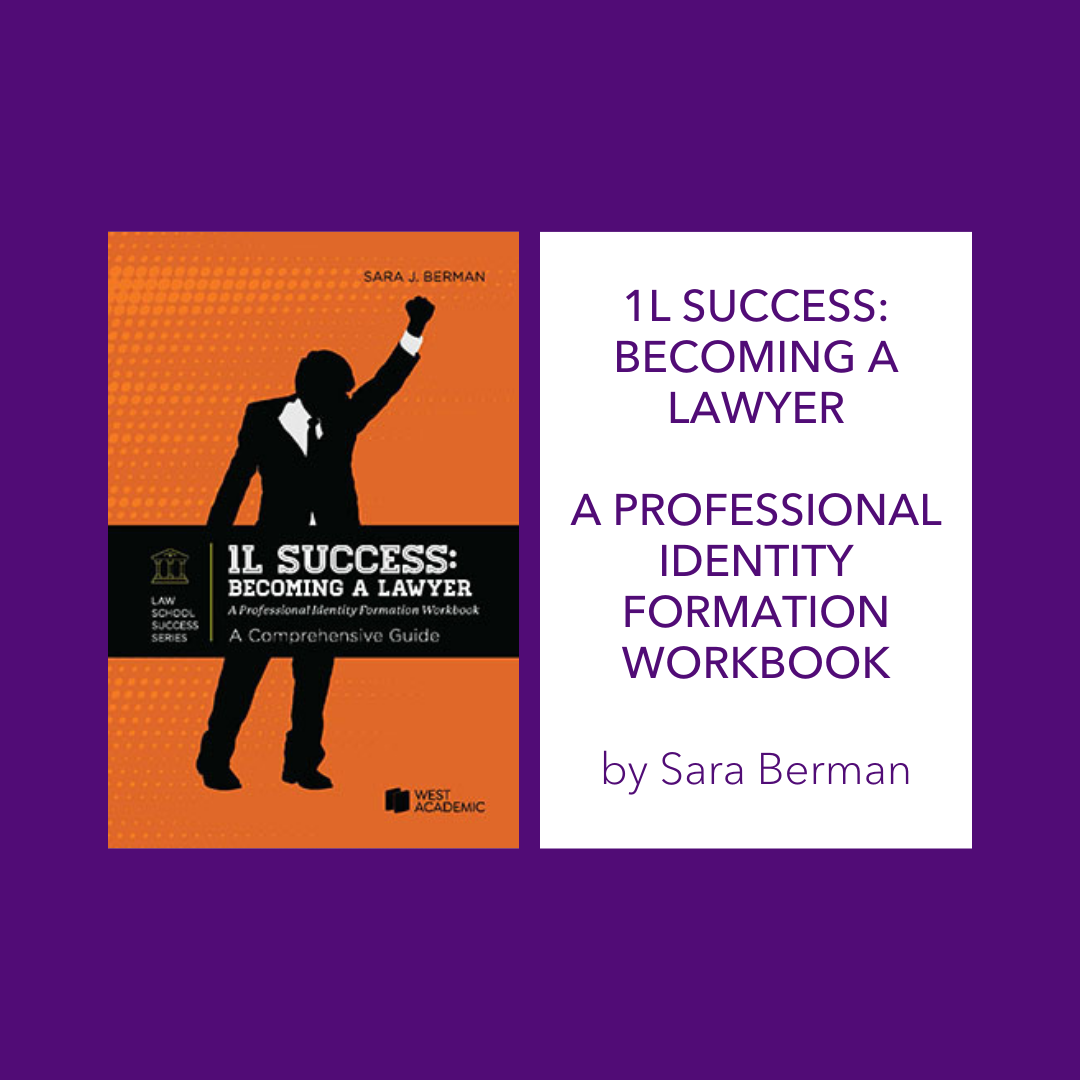By: Sara Berman, Professor of Lawyering Skills &
Director of the Academic Success Program, USC Gould School of Law
1L Success: Becoming a Lawyer, a Professional Identity Formation Workbook (West Academics, 2024) is an interactive workbook designed to infuse professional identity formation (PIF) content and an array of reflection opportunities for law students in a variety of settings including, but not limited to, orientations, ABA Standard 303(b) workshops, doctrinal courses (such as Professional Responsibility), skills classes, Academic Success Programs (ASP), and individual student counseling.
1L Success was intentionally created as a brief volume and written in straightforward language to promote accessibility. In schools with West Academic subscriptions, your students may access the electronic version for free with their West login.
If you are working with 1Ls –in a faculty or administrative position– or you’ve been tasked with programming on professional identity formation to satisfy ABA Standard 303(b), then this book is for you –well, for your students! The reflection exercises in the workbook will help students find strategies, tools, and meaning as they move along their success journey and begin developing their identity as future lawyers.
The book’s Foreword, written by the Holloran Center’s Co-Director Jerry Organ, gives additional perspectives on how this volume will be useful to today’s law students. It is with deep gratitude to Jerry, the Holloran Center, and everyone in legal education that I share information about this workbook. I hope that it will help us all in educating today’s and tomorrow’s lawyers.
Below is a chapter-by-chapter summary with ideas on where the content may fit into orientation, courses, workshops, and individual counseling of students. Because students can download the content for free, you can easily choose to use selected chapters or even selected reflections
Chapter 1 – Before Law School and Orientation – This brief content (7-pages) can help set a tone for discussion groups at Orientation. In particular, it directly hits and encourages reflection about the imposter syndrome that many people, especially first gen students, feel starting law school. It also helps students focus on their “why” and on the great value of being a lawyer –a why that will help throughout the entire professional journey.
Chapter 2 – Start on a Positive Foot: Your Path is not Predestined – These pages contain an array of reflections that will be useful to set a growth mindset and positive tone.
Chapter 3 – Become a Critical Reader – This content focuses on the importance of critical reading for law school success. It provides strategies and food-for-thought reflections that include focus and meaning in the readings.
Chapter 4 – Find Your Why – This content dives even deeper into encouraging and motivating students by helping them to step back and reflect on their own why. The reflections in this chapter provide tools for individual and group reflection exercises; teamwork and collaboration are consistently deemed important parts of law practice but are often not emphasized in law school.
Chapter 5 – Hard Work is the Most Important Part of Success – This content seeks to “normalize” hard work and self-driven work. It helps dispel myths that there is something wrong with students when law school learning doesn’t come easily.
Chapter 6 – Visualize Yourself as a Lawyer – This section is useful in discussion groups and individual reflection opportunities, empowering students by encouraging them to see themselves as lawyers. With this framing, many of the other goals of educating lawyers comes more easily and becomes more meaningful and tangible. (I frequently speak with students about “their future clients.” The entire perspective seems to change when they move beyond their student identity and begin to see themselves as lawyers.)
Chapter 7 – Enhance Focus, Reduce Distractions – This pairs well with student affairs, ASP workshops, and individual meetings to assist busy law students fighting distraction and promoting focus, a critical skill for effective lawyers.
Chapter 8 – Active Learning – This chapter can be used in Orientation and in mid-semester workshops as a springboard for discussion and reflections about the payoff of doing one’s own work and not relying solely on commercial study aids. It speaks to grit,work ethic, learning science, and self-driven learning –topics you may want to weave into orientation, courses, workshops, and student meetings.
Chapter 9 – Surround Yourself with Positive People – This is useful for Student Affairs and ASP and others working with first gen and other students who are struggling with finding a supportive community and tuning out overly competitive or negative peers. This chapter is also helpful for those who need assistance explaining the demands of law school to family, friends, and partners. There are sample dialogues and simulations that can be used as role-plays during orientation, workshops, and individual counseling.
Chapter 10 – Turn Panic into Power, Anxiety into Adrenaline – Useful for Student Affairs, ASP, and others who address law student anxiety throughout 1L and in workshops that prepare students for midterms and finals.
Chapter 11 – What is IRAC? – Useful at Orientation and in ASP, skills workshops, and individual meetings to demystify the recommended logical template for writing and thinking in law school. This content includes practice exams that test IRAC skills but are based on non-law hypos so that students can use them as learning opportunities (and opportunities to freely make mistakes!) at any point before or during 1L. Sample outlines and answers are also included at the end of the workbook, after the Glossary.
Chapter 12 – Daily Habits– Useful at Orientation and in professional identity formation workshops and individual meetings to help students become more intentional about incorporating professional perspectives into their daily habits and being more accountable to themselves and others for their actions.
Chapter 13 – Exams– Useful at Orientation and in ASP workshops and individual meetings to prepare law students for exams and help them see how different law school exams are from exams in their previous educational experiences. This helps enhance belonging in the sense that many first gen students and others who feel like they are “outsiders” think that some of their classmates have an edge.
Chapter 14 – Second Semester, Work on Improving from First Semester – Useful in spring or second semester workshops, classes, and individual meetings as a springboard for reflection on growth mindset and how to improve going forward.
Chapter 15 – Draft Your Law School Success Plan – This provides an adaptable tool that can be viewed as a living document to promote planning and reflection for continuous improvement throughout law school.
Chapter 16 – Thinking Ahead to After 1L – Useful for Career Services, Student Affairs, and others who are helping students to think about their professional goals and transferable skills.
Glossary – Useful for Orientation and throughout 1L as a springboard for exercises and reflection re: fluency of terminology. Knowing “the lingo” is critical for law school success and helps students socialize and acculturate to law school and the legal profession.
Please access the workbook here and feel free to reach out to Sara Berman at SBerman@law.usc.edu if you have any questions or comments.

Sara J. Berman is a professor of lawyering skills and the director of the Academic Success Program at the University of Southern California Gould School of Law.
